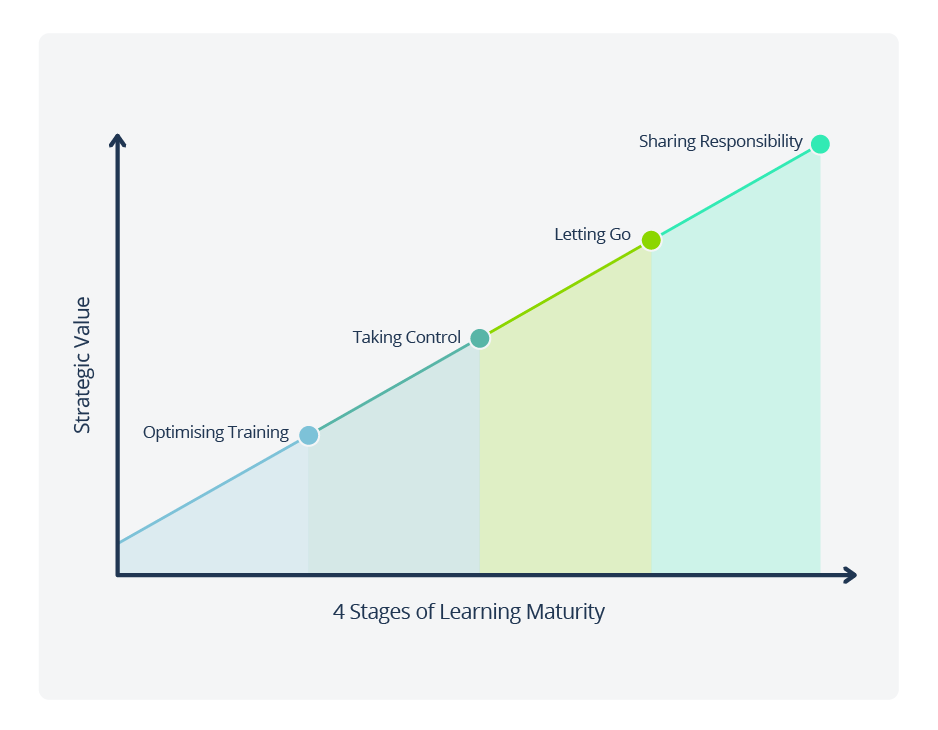 A high-performance learning culture should be the goal of learning and development professionals everywhere. But, it’s an objective that few are able to achieve.
A high-performance learning culture should be the goal of learning and development professionals everywhere. But, it’s an objective that few are able to achieve.
In today’s business landscape, the only constant is change. As a result, knowledge is now a currency and adaptability is a superpower. The organisations that are able to thrive in these conditions are those who have forged a genuine learning culture.
After all, learning is not a one-off event. It’s an ongoing process with ever-shifting goalposts. Skills require practice and refinement. Information quickly becomes outdated. Keeping up requires a steadfast organisation-wide commitment.
Your organisational culture is the linchpin that shapes how your employees collaborate, make decisions and navigate challenges. It keeps you resilient or leaves you vulnerable. In the words of Peter Drucker, ‘culture eats strategy for breakfast’.
Unfortunately, you can’t conjure a learning culture up out of thin air. A CIPD study has found that whilst 97% of L&D practitioners strived to create a learning culture, only 36% of them felt they had been successful in doing so.
In this article, we’ll explore what a learning culture is, what benefits it creates and how you can cultivate one of your own. We’ll even explore some real world examples of high-performance learning cultures. Okay culture vultures, let’s get started!
What is a Learning Culture?
A learning culture, just like an organisational culture in general, is a nebulous entity. As leadership communication expert Shane Hatton puts it, ‘culture is easy to describe, but hard to define.’
But don’t click away just yet. We’ll get there! Indeed, if you search across the web, you’ll find a variety of definitions. We’ve included some choice cuts below:
- ‘A learning culture is an environment that demonstrates and encourages individual and organisational learning, and where both gaining and sharing knowledge is prioritised, valued and rewarded.’ (Source: Centre for Creative Leadership)
- ‘A learning culture is a culture in which trying new things and failing is not only okay, but also actively encouraged… Team members have the time and space to grow their knowledge and develop new skills.’ (Source: Business Leadership Today).
- ‘A learning culture is a culture that supports an open mindset, an independent quest for knowledge, and shared learning directed toward the mission and goals of the organisation.’ (Source: Corporate Executive Board)
From these definitions, it’s possible to identify some common themes. With this in mind, here’s our attempt to define what a learning culture is.
A learning culture is formed by a community that embraces common values, principles and behaviours, all aimed at fostering ongoing learning and growth.
Whilst this is a simple definition, it draws attention to a few crucial components. Specifically, culture requires a full community (not distinct individuals or departments), a shared commitment and a focus on continuous growth.
This shared commitment has to be organisation-wide. As such, a directive from your learning and development or leadership team simply won’t cut it. Whilst these areas of the business can help to lay the foundation, your entire workforce will need to adopt a growth mindset.
To help further our understanding, let’s explore the essential traits of a learning culture.
The Key Characteristics of a Learning Culture
Curiosity: Your community is open minded and receptive to new information and experiences. They are also willing to embrace different perspectives. In general, they are knowledge-hungry and have a curiosity-driven outlook.
Growth Mindset: Your learners are united by their collective growth mindset. This is a shared belief that you can develop your knowledge, skills and ability through focus, hard work and a dedication to learning.
Continuous Improvement: Learning is viewed as a journey, rather than a destination or a fixed point in time. As a result, your community doesn’t like to sit still. They’re restless and are always clamouring for their next learning opportunity.
Experimentation: Innovation and creativity is not possible without experimentation. This makes it a key part of any thriving learning culture. Experimentation allows us to learn from failure and solve real world problems.
Knowledge Sharing: As a community, rather than a collection of isolated individuals, collaboration and open communication are actively encouraged. Knowledge silos don’t exist and information is shared wherever possible.
Learning Support: Without the right support, your learning culture will wither on the vine. As such, in a standard learning culture there are ample provisions for accessing valuable resources and tools that aid knowledge acquisition.
Leadership Commitment: As we’ve seen, learning cultures require an organisation-wide commitment to growth. As a result, your business leaders need to set the tone by demonstrating their own dedication to the cause.
The Benefits of a Learning Culture
 Given these characteristics, it should be easy to see how a learning culture could help your organisation to maintain its competitive edge.
Given these characteristics, it should be easy to see how a learning culture could help your organisation to maintain its competitive edge.
Indeed, a learning culture could be the difference between surviving and thriving. But the benefits don’t stop there.
There’s a reason why Josh Bersin once said, ‘the single biggest driver of business impact is the strength of an organisation’s learning culture.’
According to research by Deloitte, organisations with a high-performance learning culture have access to a variety of eye-wateringly impressive benefits:
- Innovation: They are 92% more likely to innovate.
- Profitability: They are 17% more likely to be a market leader.
- Skills: They are 58% better prepared to meet future challenges.
- Time to Market: They are 34% better at responding to customer needs.
- Quality: They have a 26% greater ability to deliver quality solutions.
- Productivity: They enjoy 37% greater employee productivity.
According to research by Towards Maturity (now Mind Tools), only 10% of organisations reach the top of the ‘transformation curve’ and successfully cultivate a high-performance learning culture. These ‘top deck’ organisations can expect:
- 3x faster growth
- 3x greater productivity
- And 3x higher profitability
This demonstrates that a high-performance learning culture is not a fanciful and intangible thing. Instead, getting your learning culture right has a meaningful impact on your organisation’s bottom line.
The Transformation Curve
By utilising their extensive database of over 6,500 learning and development professionals, Towards Maturity (now Mind Tools), were able to identify four distinct stages that lead to a high-performance learning culture.
This became a data-backed learning theory called ‘The Transformation Curve’. By tracing the curve, you can begin to chart your course towards your very own learning culture.

Here are the four unique stages that move your L&D strategy from that of a centralised training delivery unit to that of a power station of organisational knowledge.
Stage 1. Optimising Training
At the first stage, organisations are focused on delivering as much training content as possible at a low cost. Efficiency is the name of the game. As such, the following activities are typically prioritised:
- Setting the organisational L&D strategy.
- Earning stakeholder buy-in.
- Implementing a learning management system.
- Making training content available to learners.
As a result, training experiences at stage one aren’t particularly democratic or learner-focused. Indeed, your learners will likely see their training experiences as compliance hoops that you are asking them to jump through.
However, this stage does lay the groundwork for your future success.
Stage 2. Taking Control
By stage two, organisations typically move beyond looking at efficiency and start to recognise the importance of engagement. After all, cost-effective learning is all well and good, but you also need to feel confident that your training is moving the dial.
At this stage, your team will focus on the following:
- Providing learners with increased flexibility and options.
- Optimising learning technology solutions to produce better results.
- Utilising internal marketing strategies to improve learning uptake.
- Building team capability and capacity.
In other words, learning is no longer a simple box-ticking exercise. Engagement metrics and learning outcomes have begun to matter.
Stage 3. Letting Go
If you love something, let it go. Stage three is all about loosening your grip over the learning function within your organisation.
Your goal is to transform from a deliverer into a facilitator. Training should also become a continuous process, rather than a series of one-off events. As a result, you’ll focus on the following activities at this stage:
- Establishing business and training needs.
- Seeking feedback and suggestions from learners.
- Facilitating social learning and informal learning experiences.
- Tracking and reporting on what is and what isn’t working.
Giving your audience more ownership over their learning experiences can increase motivation and engagement levels. It will also help you to take the final step in your journey toward a high-performance learning culture.
Stage 4. Sharing Responsibility
You’ve made it. By this stage, the steps you took as you moved up the curve have helped you to cultivate a clarity of purpose between your L&D function, your business stakeholders and your learners themselves.
As a result, you are united in your learning goals and have a shared vision of the outcomes that matter. Moreover, your learning ecosystem is a bustling hub of activity, your learners are actively engaged and this is generating meaningful business impact.
At this stage, you’ll likely be focusing on the following activities:
- Recognising and rewarding your top learners.
- Sharing your successes with your stakeholders.
- Using data to drive effective decision making.
- Iterating and improving wherever possible.
That last point is important. You may have reached the top of the curve, but you can’t rest on your laurels. After all, continued success will rely on constant evolution.
But for now, give yourself a pat on the back. It has been quite the journey.
Where Are You Now?
As you read through the stages of the transformation curve, you probably considered where your organisation currently stands and where you wish it was. Hopefully you’re inspired and not daunted.
Of course, no one stage is ‘better’ than any other. Every organisation is on their own journey and is working out which strategy fits them best. That said, there are tools out there that can help you to benchmark your L&D performance.
For instance, why not check out our L&D Health Score calculator? This brief assessment can help you to validate your approach, find weaknesses and elevate your strategy.
8 Tips for Creating a Learning Culture
We’ve seen the stages you’ll need to work through as your learning function develops in maturity. But what practical things can you do to speed this journey along? To help address this question, we’ve compiled 8 tips for cultivating a high-performance learning culture.
Set a Clear Vision: Whilst a learning culture requires an organisation-wide commitment, you and your leadership team can help to set the tone. You should start by outlining what a learning culture means in the context of your organisation. Then share the values, principles and behaviours that align with this vision.
Use the Right Tech: Once you have a vision in place, you’ll need to invest in the right tools. As continuous learning is the order of the day, you should ensure that your learners have easy access to an online learning solution. For instance, consider implementing a learning management system or a learning app.
Provide Learning Opportunities: With learning technology in place, you’ll also need to create and share a diverse range of learning opportunities. You should invest in eLearning content (custom or off-the-shelf), ILT, vILT, workshops, immersive learning and access to other educational resources.
Facilitate Social Learning: To successfully maintain your learning culture, you’ll also need to encourage and facilitate informal learning experiences. Social learning, for instance, helps to promote collaboration, knowledge sharing and a sense of community. It also provides opportunities for continuous improvement.
Recognise & Reward Your Learners: Celebrating your learners’ achievements helps to reinforce your learning culture. For instance, why not gamify your learning platform? By Providing Badges, XP, Levels, Leaderboards and Battles, you’re helping to incentivise learning and create a rewarding feedback loop.
Find Your Epic Meaning: Epic Meaning is the sense of purpose that fuels our passion for a cause. To achieve this, you should ensure that your learning objectives are tied to your organisation’s mission, vision and values. You can also use the power of narrative to forge an additional layer of motivation.
Offer Support: With a high-performance learning culture in place, your focus will switch from delivery to facilitation. Therefore, you should also provide opportunities for mentorship and coaching. After all, your more experienced employees and subject matter experts will play leading roles in your new learning community.
Evaluate & Adjust: You should regularly assess the effectiveness of your learning initiatives. Your learning technology solution will have a reporting area that provides access to a bounty of useful data. Furthermore, you should also be open to making adjustments based on learner feedback and suggestions.
Examples of High-Performance Learning Cultures
Creating a high-performance learning culture can sometimes feel like an unattainable goal. Let’s face it, the majority of organisations never quite pull it off. But it’s an investment that holds immense value and is undeniably worth pursuing. Good things rarely come easy.
We’ve curated the following real-world examples of high-performance learning cultures. Our aim is not only to ignite your inspiration but also to underline the profound transformative potential of a thriving learning culture.
 Google: Google is renowned for its commitment to continuous learning and innovation. This is perhaps best exemplified by their ‘20% time’ policy. This empowers Google employees to spend 20% of their workweek on personal projects or learning activities of their choice. They also run a knowledge sharing network called ‘Googlers-to-Googlers’.
Google: Google is renowned for its commitment to continuous learning and innovation. This is perhaps best exemplified by their ‘20% time’ policy. This empowers Google employees to spend 20% of their workweek on personal projects or learning activities of their choice. They also run a knowledge sharing network called ‘Googlers-to-Googlers’.  Netflix: Freedom and responsibility are key aspects of Netflix’s well documented organisational culture. They champion experimentation and the scientific method (the use of A/B testing) as a means of learning from both successes and failures. Furthermore, they’ve even published a blog titled, ‘Netflix: A Culture of Learning’.
Netflix: Freedom and responsibility are key aspects of Netflix’s well documented organisational culture. They champion experimentation and the scientific method (the use of A/B testing) as a means of learning from both successes and failures. Furthermore, they’ve even published a blog titled, ‘Netflix: A Culture of Learning’. HubSpot: Learning is one of HubSpot’s core values. HubSpot’s ‘Culture Code’ has been viewed more than 5 million times. It contains statements like, ‘Power is now gained by sharing knowledge, not hoarding it’. Perhaps this is why HubSpot Academy resources are available (free of charge) to employees, customers and the general public.
HubSpot: Learning is one of HubSpot’s core values. HubSpot’s ‘Culture Code’ has been viewed more than 5 million times. It contains statements like, ‘Power is now gained by sharing knowledge, not hoarding it’. Perhaps this is why HubSpot Academy resources are available (free of charge) to employees, customers and the general public.
Final Word
Your organisation isn’t just a group of individuals. There’s an invisible thread that binds everyone together and provides stability, purpose and a shared sense of direction. This thread is your organisational culture.
Likewise, you can’t create a winning learning culture with a disparate group of individuals pulling in different directions. After all, a learning culture requires a growth mindset and a shared commitment to innovation, adaptation and improvement.
We’ve seen that there are four stages you can work through as you move from becoming a training delivery unit to a learning experience facilitator. At the end of this journey, you’ll have achieved something that very few before you have managed.
You’ll have forged your very own high-performance learning culture. Happy learners and genuine business impact awaits. For those about to embark on this journey, we salute you!
Thanks for reading. If you’re eager to further hone your L&D skills and knowledge, we’ve got you covered. Download ‘The L&D Professional’s Handbook’ now to unlock 165 invaluable tips and insights.








